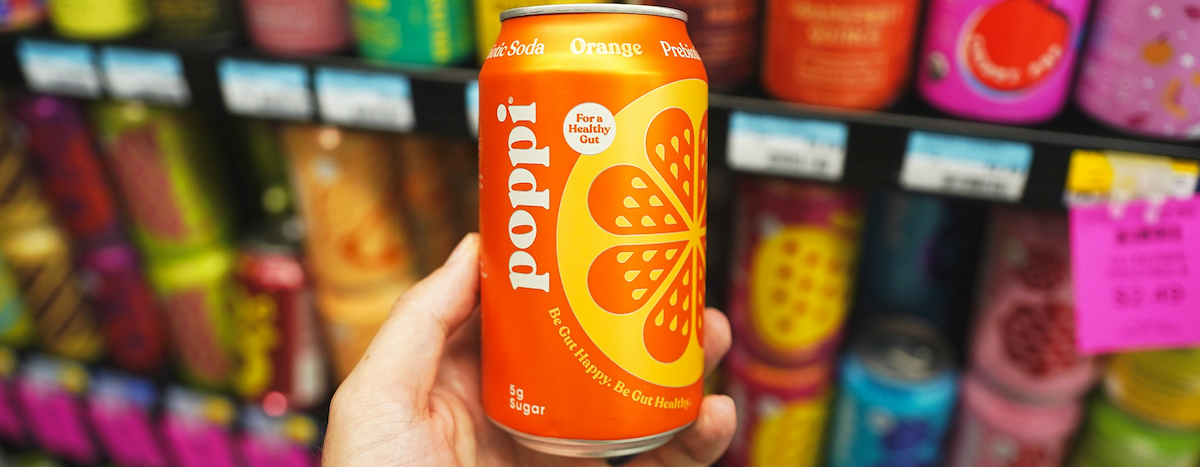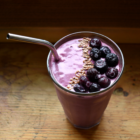
I’ve seen a lot of prebiotic drinks hit the market that are branded as a new, healthier type of soda. They are high in fiber, lower in sugar, and apparently really good for your gut. But, are they really? Are these prebiotic drinks as healthy as they claim? Let’s find out—but first, let’s talk about the cons of soda.
Most of us can agree that regular soda is not the healthiest choice. For instance, a 12-ounce can of Coca-Cola has 39 grams of added sugar, which is roughly 1.5x higher than the current recommendation of added sugar intake per day. The current recommendation is that most Americans should stay under 25 grams of added sugar daily. Regular soda also contains zero nutrition, and drinking it regularly can increase your risk for weight gain, heart disease, tooth decay, cancer, diabetes, and sugar cravings.
So, is diet soda better?
Diet soda may seem like a healthier option since it contains zero grams of added sugar. However, it is often loaded with artificial sweeteners and additives. These ingredients have been shown to increase sugar cravings, alter taste buds, and negatively impact gut health. So, depending on your personal goals, this may not be your best option.
That’s where prebiotic soda comes into play. Compared to regular soda, prebiotic soda can be significantly lower in calories and sugar, contain more natural ingredients, and contain fibers/prebiotics which can support gut health. So, prebiotic sodas are healthier than regular sodas. And, if you like them, there is no reason why you can’t enjoy them regularly. But, here are some key points to keep in mind:
1. Prebiotics can be triggering to some
The prebiotics added to the sodas can cause gut symptoms, such as bloating and gas, in some individuals. Not everyone will be affected by this but it’s worth paying attention to.
Different brands have different amounts of prebiotics. If your gut tends to be more sensitive, you may tolerate the options with lower amounts of prebiotics.
You might be wondering… aren’t prebiotics good for the gut? Yes, they are. But they can also highlight what is going on in your gut—so it’s not uncommon for individuals with IBS or gut issues to be reactive to high fiber/prebiotic foods before treating their gut issues.
Gut health is complex. Relying on one product or one supplement to fix everything doesn’t work.
2. They still do contain added sugar
The amount of added sugar will vary between brand and flavor. On average, most prebiotic sodas contain between 2-4 grams of added sugar. While it is much lower than the 39 grams found in a regular soda, it is still worth noting as this will cause a spike in blood sugar.
If you have pre-diabetes, diabetes, PCOS, or any condition that impacts your blood sugar, the spike in blood sugar from drinking these beverages may be even higher. Drinking these sodas with a meal or food containing protein or fat can help to stabilize blood sugar spikes.
3. Optimal gut health is best supported in other ways
These sodas have fun flavors and can be a tasty alternative to regular soda, but relying on them to support your gut health is a bad idea. Why? Gut health is complex. Relying on one product or one supplement to fix everything doesn’t work. Optimal gut health is about supporting your gut from multiple angles – what you eat, how you eat, when you eat, and treating root causes. You need a holistic approach that includes not only dietary intake but how you live your life as a whole. Focusing on one product or one ingredient, such as prebiotics, goes against this entire thread.
On the flip side, getting 4-9 grams of fiber from one product alone can certainly be a part of your holistic approach to gut health. As a gut health dietitian, I can even admit that 9 grams of fiber in one beverage is impressive, especially when the current recommendations are that most Americans get between 25-38 g of fiber per day.
However, nothing beats getting fiber in its most natural form—plant foods—where it comes naturally packed with vitamins, minerals, antioxidants, and phytonutrients.
Bottom line: Prebiotic beverages can be used in conjunction with a naturally high-fiber diet, but shouldn’t be used to replace natural food fiber in a diet.
- Eating Behavior (47)
- Grocery Shopping Tip (9)
- Gut Health (42)
- Healthy Eating (49)
- Low FODMAP (13)
- Nutrition Articles (32)
- Recipes (27)
- Uncategorized (4)



